Tuesday Triage #33
- TUESDAY TRIAGE #33 by Vadim Drobinin
- On scientific approach
- Things I enjoyed reading
- 1. Read this before you buy a Soviet camera by Stephen Dowling
- 2. Things I Made That Sucked by @jordanmorgan10
- 3. Your Thinking Rate Is Fixed by fs
- 4. I’ll Pay You to Read My Book by Kevin Kelly
- 5. Millions Are Hounded for Debt They Don’t Owe. One Victim Fought Back, With a Vengeance by @ZekeFaux
- 6. The battery invented 120 years before its time by Allison Hirschlag
- 7. Is the Western way of raising kids weird? by Kelly Oakes
- 8. Git is my buddy: Effective Git as a solo developer by Mikkel Paulson
- 9. When Did Generic Grocery Brands Get So Good Looking? by Rachel del Valle
- 10. The English Style by Margarette Lincoln
- Things I didn't know last Tuesday
- 1. Pringles Salt & Vinegar is not vegan, while Pringles Smokey Bacon is vegan
- 2. Suzuki Method
- 3. Ukrainian wedding traditions
- 4. Changes in cow's food affect butter spreadability
- 5. Masters of Wine's research papers
- 6. Oyuwari
- 7. Australian Brithday song
- 8. Balloonomania
- 9. Odors are the most effective when it comes to bringing back memories
- 10. Joseph Bazalgette
- Book of the week
- Thank you and see you in a week!
TUESDAY TRIAGE #33
by Vadim Drobinin ¶
Your weekly crème de la crème of the Internet is here!
02.03.2021 (read in browser)
On scientific approach ¶
This weekend a had a chance to revive one of the recipes from my childhood and pickle some cucumbers and tomatoes.
The problem with tomatoes is that I never really liked them pickled, so do not really remember the taste.
And the problem with cucumbers is their distinctive taste, which is rather far from the pickles sold in the UK.
The closest ones are probably Cornichons à la russe, usually shipped from France.
There are plenty of Russian recipes out there though, and most of them call for "the vinegar", whatever it means. I am yet to find a single recipe with Britain-friendly Cider or White wine vinegar in its ingredients, which means there should be another way to solve the problem.
And there is indeed: some food-grade cleaning vinegar and pH-strips are enough to get the right dilution and pH 2.5, required for a proper Malossol.
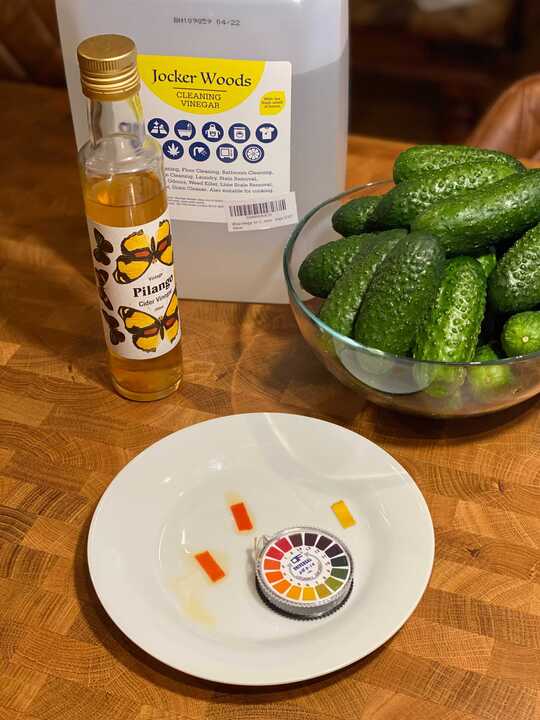
I am also too lazy to wait for weeks of fermentation, so dumped everything into sous vide for a few hours:
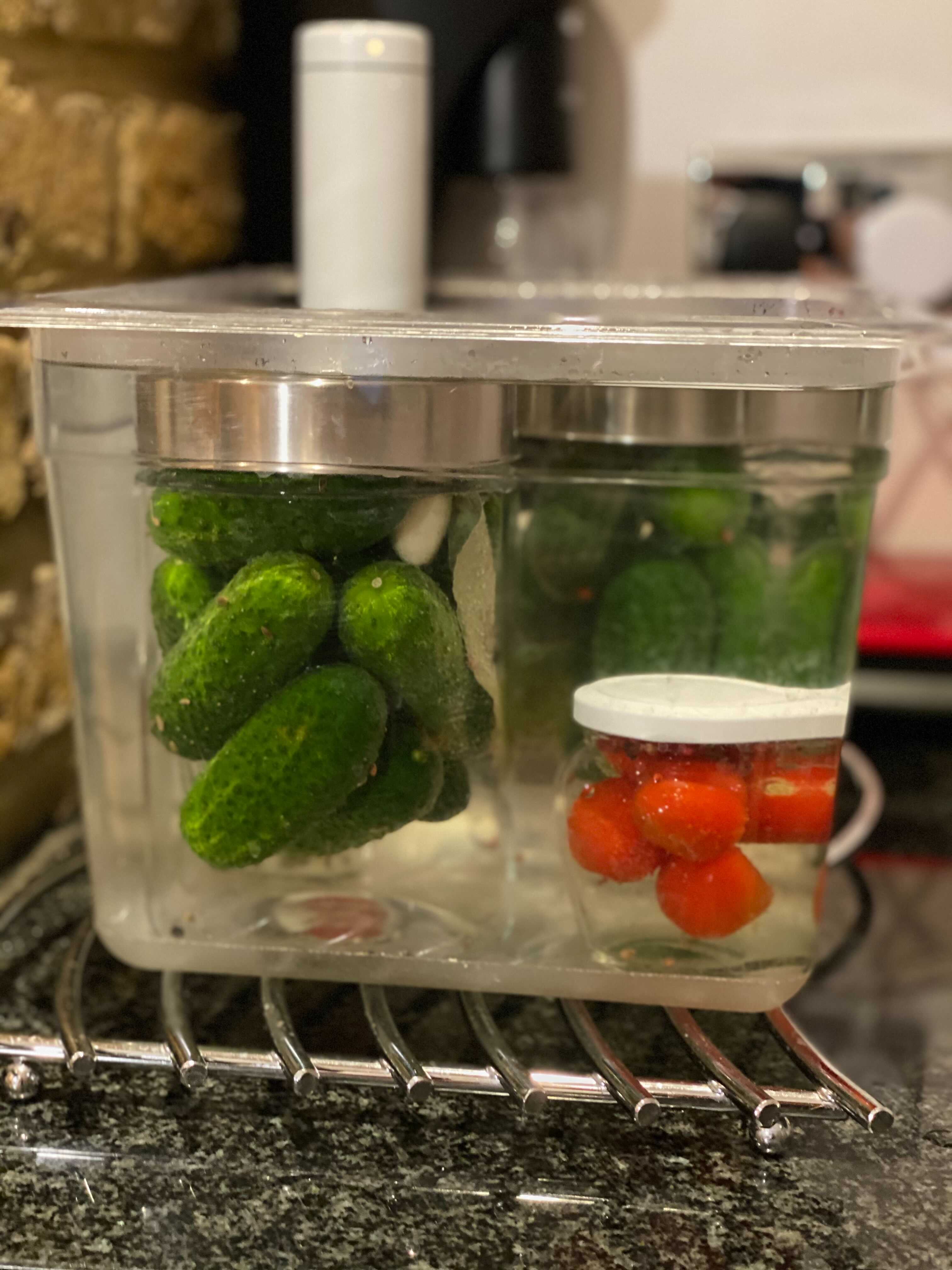
And here we are, the colour looks more like one would expect:
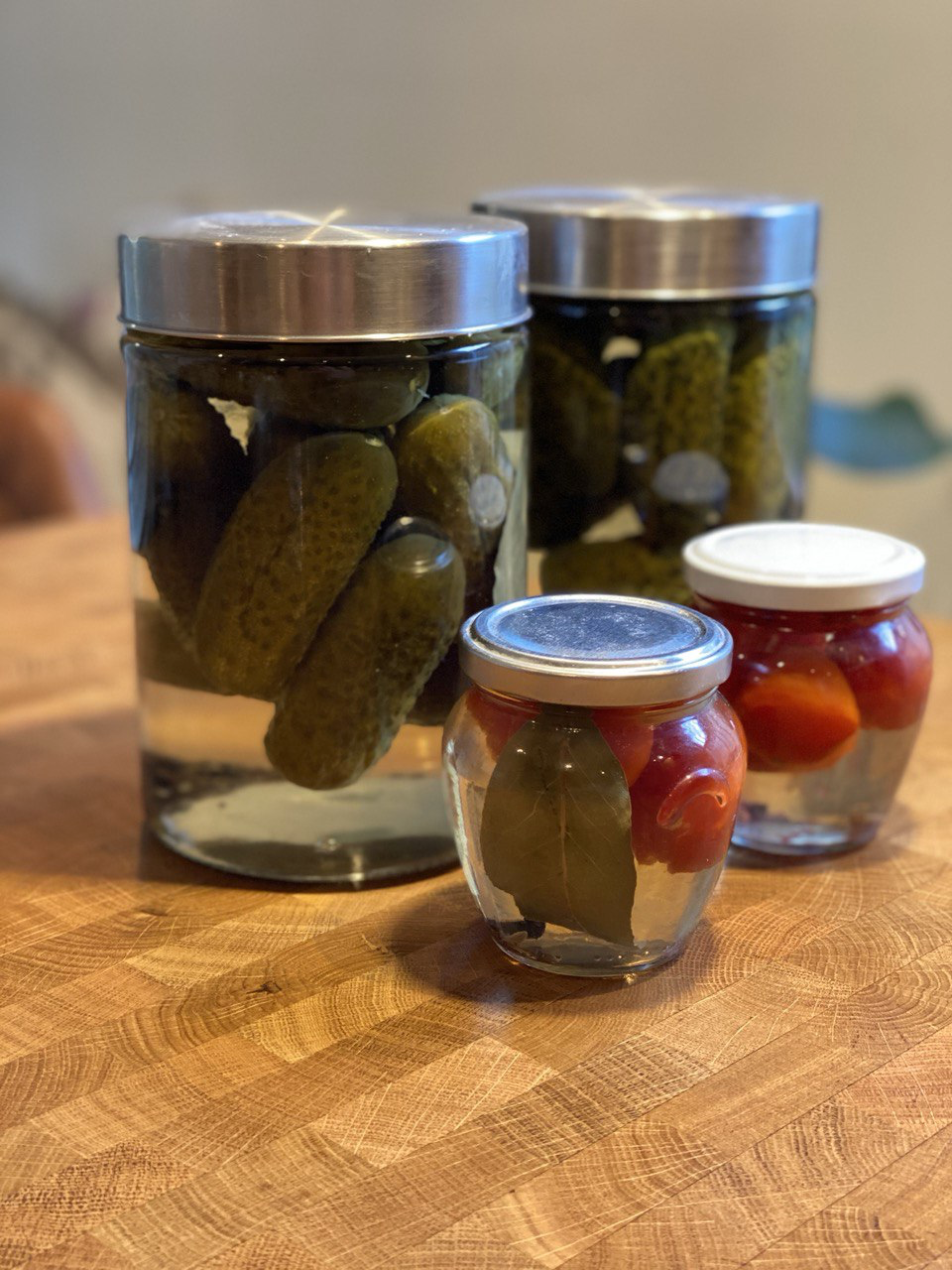
There are two tests, the smell and the snap ones, and these pickles pass both:
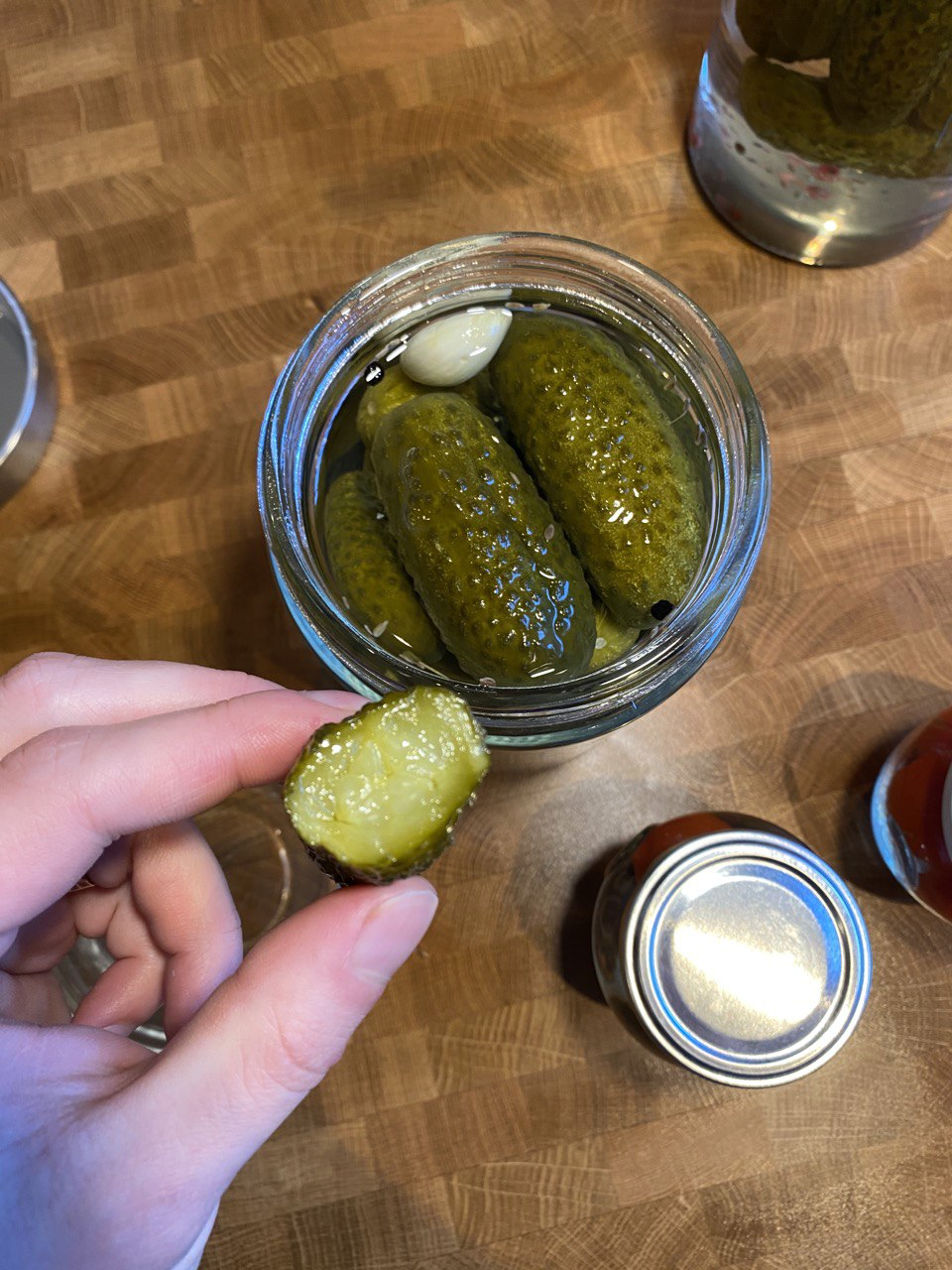
We whipped up some quick buttermilk Ranch, got homemade Japanese milk buns ready, and sliced Raclette to make burgers:

I might be biased, but that's an awesome pairing for a freshly brewed batch of our Espresso Stout.
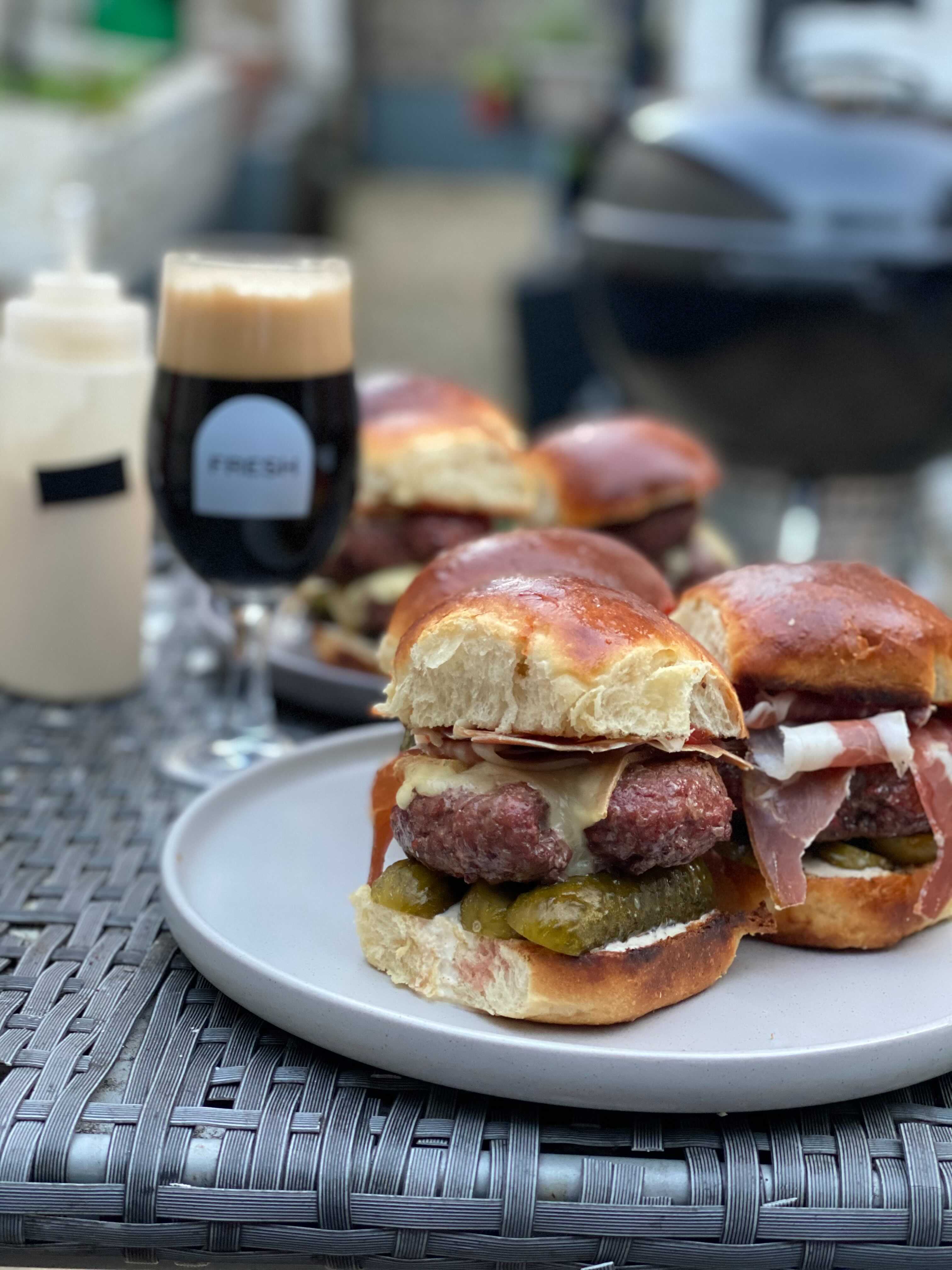
I had some burger leftovers to serve, so clarified some tomato juice with agar-agar:
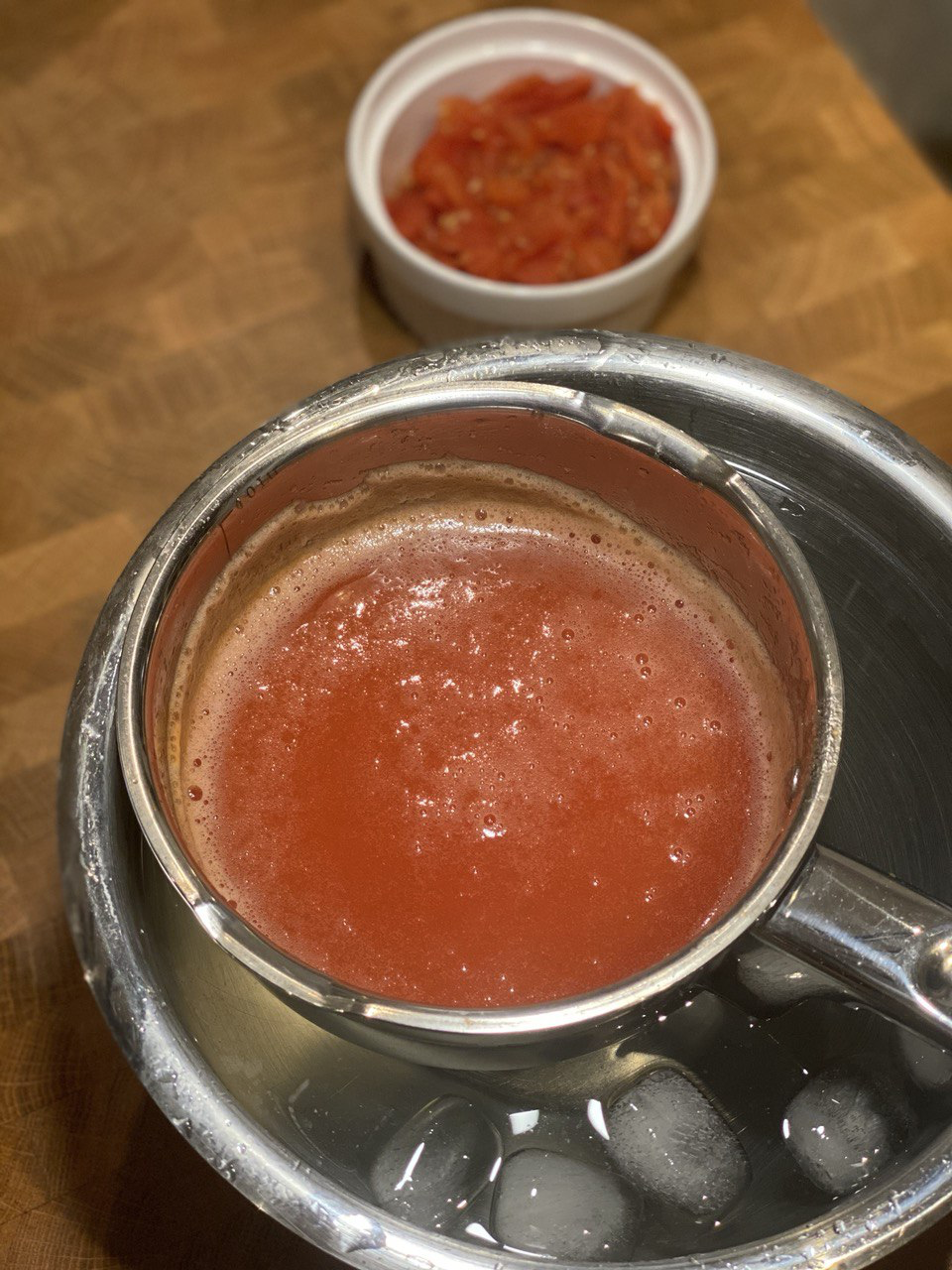
And turned it into a seethrough Bloody Mary:
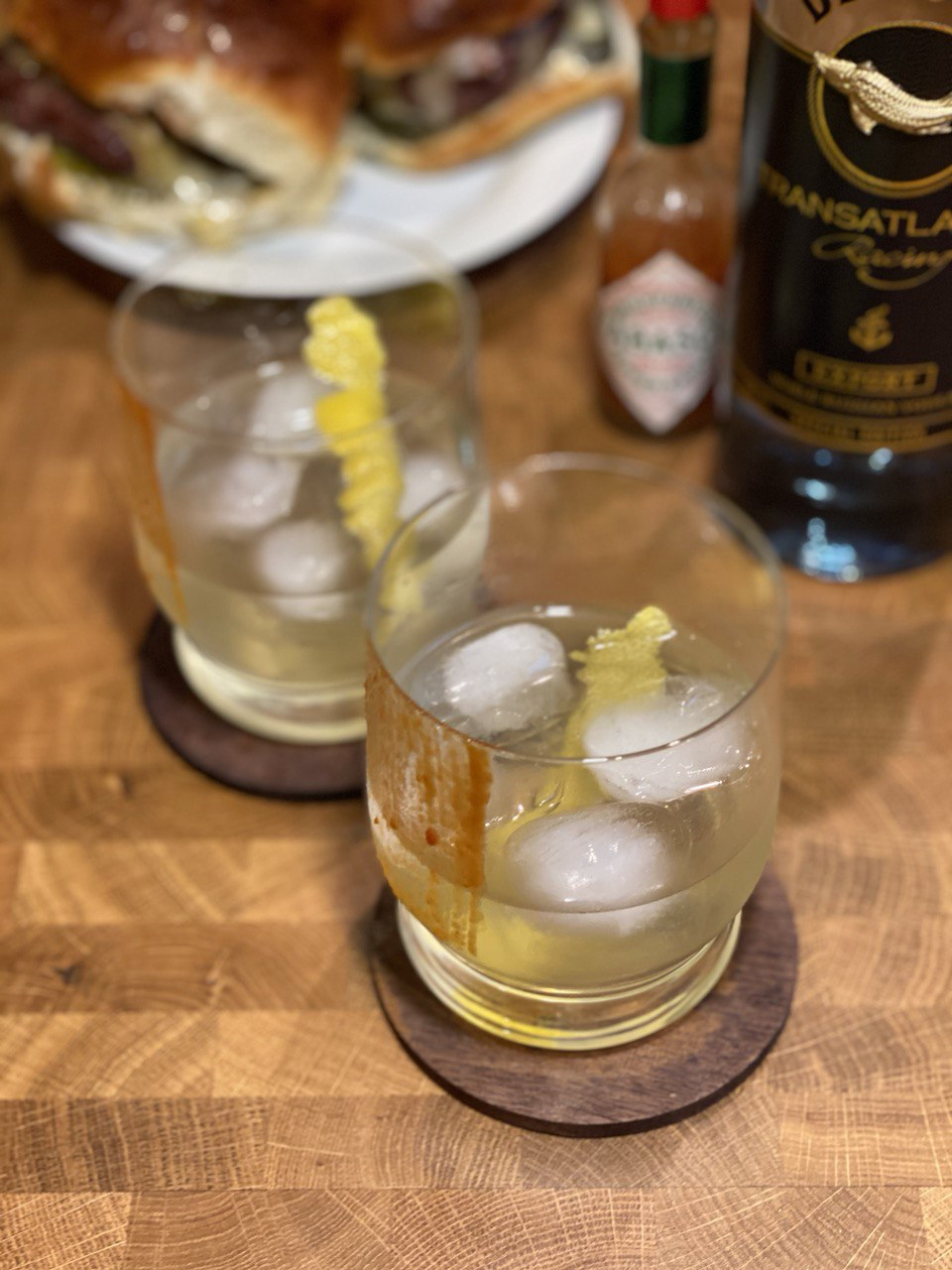
Not too shabby, albeit to me it lacks some mouthfeel. I am thinking of going the hydrocolloids route and add some xanthan or gum arabic, but seems like it won't work.
Still plenty of time to experiment though.
Things I enjoyed reading ¶
1. Read this before you buy a Soviet camera by Stephen Dowling ¶
I hold quitec a few Soviet cameras in my hands and never wanted to own them. As you might guess, until I read that ultimate walkthrough in the world of obscure devices, politics, and art.
Soviet cameras are still being used 40, 50, 60 years after they were made, and it’s unreasonable to expect Leica reliability without Leica owner levels of upkeep. “People expect Soviet cameras to work flawlessly after 50 years of existence, while being extremely understanding with other charismatic brands needing technical maintenance,” Moreira says. “Make no mistake, Soviet cameras were made down to a price, their creators would never have imagined that they still would be used in the next century. Apparently it’s acceptable to service in a special way a car made in the 1930’s, to be vigilant and sympathetic with its woes but not with a Soviet camera.”
2. Things I Made That Sucked by @jordanmorgan10 ¶
Here is a very inspiring post on being proud of things not profitable or successful in the eyes of others, for they made you into a person you are today.
When you make things that don’t end up working, and you keep shipping things that don’t sell you might put yourself in a dangerous spot without even realizing it. It becomes fait accompli that even before you spin up your next Xcode project, it’s just not gonna work. If that’s you - keep pushing! You’re close, and I promise you that.
I love the examples of projects mentioned. All my past endeavours are public too, and while I am quite confident there is plenty of room for improvement in every single of them, I never thought of hiding it despite some being in dire need of fixes.
3. Your Thinking Rate Is Fixed by fs ¶
A gripping thought that instead of striving for thinking faster we need to try and think better.
While experience and education can grant you the pattern-matching abilities to make some kinds of decisions using intuition, you’re still going to run into decisions that require you to sit and consider the problem from multiple angles. You’re still going to need to schedule time to do nothing but think. Otherwise making more decisions will make you less productive overall, not more, because your decisions will suck.
I guess the main takeaway here is to reduce pressure, e.g think of a sale landing page pressuring you into buying something before the offer expires. However it doesn't always work, and non-critical things postponed for a few times might as well just become critical in the meantime.
4. I’ll Pay You to Read My Book by Kevin Kelly ¶
This is a great concept of charging people for books, and then paying them a fraction of the price back if they read it completely.
There is satisfaction for both parties in either outcome. If the purchaser buys the book, but does not read it in full, he/she paid the acceptable price, and still owns the book. The Publisher keeps the full amount. If the purchaser finishes reading the book, they still have the book, but also earned money doing so. The publisher loses only a small amount on the sale, which can be offset from greater sales to others.
I'd probably do that. Both as a writer (as frankly writers sometimes are happy to give books away for free in exchange for a feedback; a good review costs way more), and as a reader (because I tend to finish books even if they are terrible; I have more faith in books than in people and do believe that gems might be hidden even in postscripta).
5. Millions Are Hounded for Debt They Don’t Owe. One Victim Fought Back, With a Vengeance by @ZekeFaux ¶
I won't be surprised if Netflix is already making a movie based on this article, as reading it felt like watching a new part of Bondiana but about someone offended by scum phone calls.
Therrien’s tactics grew more intense, mirroring those of the debt collectors he loathed. As he had in Buffalo, he developed a network of sources in Kansas City, figuring out who hated whom and playing them off each other. He got a burner app that provided disposable numbers for his smartphone, with any area code he wanted. He called wives, widows, business partners, even a waitress who’d once worked at a restaurant the Tuckers owned.
The main character should be played by Liam Neeson, obviously.
6. The battery invented 120 years before its time by Allison Hirschlag ¶
Apparently Thomas Edison invented a battery which seemed useless until it became one of the most sought-after technologies in 2021.
But more than a century later, engineers would rediscover the nickel-iron battery as something of a diamond in the rough. Now it is being investigated as an answer to an enduring challenge for renewable energy: smoothing out the intermittent nature of clean energy sources like wind and solar. And hydrogen, once considered a worrisome byproduct, could turn out to be one of the most useful things about these batteries.
7. Is the Western way of raising kids weird? by Kelly Oakes ¶
After reading the title I paused for a second to check two things: whether Russia would be considered Western enough to assume that children there are raised in the same way as in more civilised countries, and then to make sure that my hometown is in European, not Asian part of Russia.
Well, for those wondering: yes, it is in the European part. No, I would hardly call Russian ways to rais kids "Western".
Encouraging early independence aligns with a typical Western cultural focus on individualism. For that reason, bedsharing can seem to some like giving in to your child, and encouraging them to stay dependent on their parents. But parents with a more collectivist mindset, like Dutta, usually don't see it that way. "You give them some self-confidence and some independence, they will separate from you on their own," she says. "They will not stick to you forever."
Whatever works I guess?
8. Git is my buddy: Effective Git as a solo developer by Mikkel Paulson ¶
As you might have noticed, I mostly enjoy reading things that either amuse, or entertain, or are inline with my own thoughts.
This post is indeed from the latter category: I do think that all developers out there should give a try to Git, and that's not some kind of gatekeeping: feel free to use whatever tools you find useful, whether it's clicking dozens of buttons in some GUI app or writing a short command in Terminal, just use it.
But what if I told you that Git can be a valuable tool without ever setting up a remote repository? I'm not just talking about having a working version of your code base to roll back to if you mess something up, although there's that too. Used correctly, Git can help to structure your work, identifying gaps in your test coverage and minimizing dead code.
9. When Did Generic Grocery Brands Get So Good Looking? by Rachel del Valle ¶
Doing groceries offline seems odd in 2021 and yet I can see how it's enjoyable for some.
Companies know that nice packaging can get people to pay more for things. But private label brands defy this norm, since price doesn’t increase in direct relation to an investment in packaging. It can’t. With private label, design isn’t meant to get consumers to pay more for a product. Instead, it’s supposed to make people feel better about paying less.
I also see the aforementioned trend, and generic brands got really good at packaging, this is me speaking from the height of numerous disappointments of picking freshly roasted single origin coffee beans in various supermarket chains just to find out that they taste like dust.
10. The English Style by Margarette Lincoln ¶
A very detailed guide to 1700's British fashion, that's it.
London’s parks were places where people could display their fine dress. Charles made improvements to parks so that they offered even more attractive walks, although John Wilmot, the libertine Earl of Rochester, remarked that after dusk they were used mostly for sex. In October 1660 the king ordered a river to be cut in St. James’ Park and a new alley for the game pall mall, an early form of croquet, to run along the south side of the park wall.
Next time I am around a Royal park, I would know how to dress up for such an occasion.
Things I didn't know last Tuesday ¶
1. Pringles Salt & Vinegar is not vegan, while Pringles Smokey Bacon is vegan ¶
That's quite hilarious, innit?
The main reason that some Pringles varieties are not suitable for vegans is their inclusion of one or more ingredients derived from dairy products (for instance the milk-derived lactose in the Salt & Vinegar flavoured Pringles).
2. Suzuki Method ¶
While reading about ways to learn the piano (after learning how to play a guitar for years at a musical school, mostly unsuccessfuly), I came across this method which seems to be a default option for Western musicians.
Suzuki's "Mother Tongue" approach to teaching music builds on the principles of language acquisition. Those principles include an early beginning, listening, loving encouragement, parental support, constant repetition, learning with other children and then learning to read.
3. Ukrainian wedding traditions ¶
Here is a funny Ukrainian wedding tradition.
If the bride's parents meet the bridegroom at the door with a pumpkin, it means that his offer of marriage was not accepted by either the bride or by her family, and the pumpkin is something for him to carry, so that he doesn't leave empty-handed.
Just imagine a casual chat in the evening, "We’ve run out of pumpkins. I’m just to pop out and propose to a neighbour".
4. Changes in cow's food affect butter spreadability ¶
This has been spotted by Canadians, disappointed that their butter is not soft at room temperature anymore.
Adding palm oil-based energy supplements to cow feed is a decades-old practice said to increase the milk output of cows and increase the milk's fat content.
Must be a painful way to start one's morning.
5. Masters of Wine's research papers ¶
So hear me out.
There are only a few Masters of Wine in the world, just shy of 500, and to join their ranks is to spend lots of money on lessons, exams, tastings and so on. It's very similar to Minstrels from Peter Stafford-Bow's books I've mentioned a few times (#1, #12) and as elite.
One of the final stages is to publish a paper related to the field.
This year they've announced ten more MWs who managed to go through all these obstacles, and I had lots of fun reading through their theses. This one is my favourite:
Influences of classical music on the perception of a Brut non-vintage Champagne
6. Oyuwari ¶
I wrote about mizuwari before, which is a whisky highball served with cold water.
There is also a similar (and yet different) way to serve sake:
Oyuwari (お湯割) means “with hot water,” which is the perfect way to enjoy shochu and whisky during the winter months. When serving a drink oyuwari, hot water is usually prepared in a traditional Japanese teapot. It is then poured into a glass and the spirit is added afterward. The hot water helps to release the flavors in the spirit, adding intensity to the drink, and the result is a deliciously warm libation.
On that note, we do have a traditional Japanese teapot (at least I think it is traditional and Japanese), so now I can follow the tradition from A to Z.
7. Australian Brithday song ¶
There is an Australian birthday song (albeit also somehow popular in Wales) which brings some high quality existential horror to every party:
Why was (s)he born so beautiful,
Why was (s)he born at all?
Because (s)he had no say in it,
No say in it at all!
There are plenty of videos with people singing it in its various forms at parties, look it up on YouTube.
8. Balloonomania ¶
Balloonomania was a strong public interest or fad in balloons that originated in France in the late 18th century and continued into the 19th century, during the advent of balloon flights.

It seems odd that the past tense is used though. It's either still a "mania" (and it must be!) or they came up with an unfortunate name for an event.
9. Odors are the most effective when it comes to bringing back memories ¶
Those thinking that smells are more powerful memory anchors than anything else, you are not alone.
However, with participants between the ages of 65–70 years, the effectiveness of odors to elicit autobiographical memories was equivalent between the genders—and, notably, the number of autobiographical memories generated to odors increased with age.
10. Joseph Bazalgette ¶
Joseph Bazalgette, who designed London's sewers in the 1860's, said 'Well, we're only going to do this once and there's always the unforeseen' and doubled the pipe diameter.
This foresight allowed for the increase in London's population that came years later with the introduction of the tower block. If Bazalgette had used the smaller pipe diameter, the city's sewers would have overflowed in the 1960s. Instead, they've coped into the 21st century.

He also designed Hammersmith bridge. Such a legacy.
Book of the week ¶
Sometimes I look for a fast-food alternative in the world of books, something funny enough not to fall asleep in the bath and yet not too overwhelming to finish in a few hours.
Ray Dalio's Principles felt like one, being just a collection of short principles and rules to live by, and yet proved to be way more entertaining and complex than I though:
- Don’t “pick your battles.” Fight them all. If you see something wrong, even something small, deal with it. Because 1) small badnesses can be symptomatic of serious underlying problems; 2) resolving small differences of perception may prevent more serious divergences of views; and 3) in trying to help to train people, constant reinforcement of desired behavior is helpful. The more battles you fight, the more opportunities you will have to get to know each other and the faster the evolutionary process will occur.
I was always taught precisely the opposite.
Probably, there is truth in both: one needs to "pick one's battles" when it comes to things less impactful, and yet the reasoning about fighting as many battles as possible seems sound to me.
Apparently the author is like Steve Jobs, but for investors.
I wonder if I should pivot into an engineering manager then.
Seems like I am ready.
Thank you and see you in a week! ¶
If you have any questions, or want to suggest a link for the next newsletter, please drop me a message on Twitter or reply to this email.
Cheers! 🍸